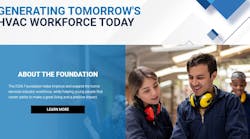On March 18th, the Sheet Metal and Air Conditioning Contractors' National Association (SMACNA) submitted comments to the Department of Labor in support of modernizing National Registered Apprenticeship standards. Many of the 3,500 SMACNA member-construction firms are of significant size and provide a wide scope of expert construction services on major projects; yet most operate family-owned businesses with smaller, highly skilled workforces. The industry's profile explains why these firms, which provide expertise and personnel far above the industry standard, rely on Department of Labor (DOL) registered apprenticeship programs (RAPs) to provide them with quality trained and certified highly skilled workers. SMACNA members specialize in industrial, commercial, residential, architectural and specialty sheet metal and air conditioning construction in public and private markets throughout the United States.
SMACNA's Statement Follows:
SMACNA applauds the comprehensive policy review and thoughtful draft proposal represented by DOL’s long overdue collaborative effort to reform its registered apprenticeship program. Our association has long been an outspoken champion of enhanced and vigorously enforced National Apprenticeship standards, and for decades, our members have advocated for and invested in RAPs far above the industry standard. By including the suggested reforms offered in SMACNA’s comments, DOL’s final rule will help alleviate the shortage of highly skilled workers in the face of an increasing number of multi-year national construction projects and build a far more robust RAP network for the future.
SMACNA leadership believes the improved apprenticeship standards will bring about the following improvements:
- Strengthening of labor standards, quality, and worker protections by making occupational skills and training more portable, enhancing alignment with postsecondary education, and providing better performance data
- Defining clearer roles for State Apprenticeship Agencies and other stakeholders within the National Apprenticeship System.
- Codifying the Office of Apprenticeship’s role for national leadership, promotion, and standards.
- Promoting apprenticeship pathways, including pre-apprenticeship and apprenticeship readiness programs, by expanding performance and data requirements to improve accountability, transparency, and program outcomes.
- Creating a student-centric model of Registered Apprenticeship, called Registered Career and Technical Education Apprenticeship designed to make them more seamless for full-time high school and community college students to enroll in a Registered Apprenticeship. This approach is modeled after high-quality youth apprenticeship systems in states across the country.
Stan Kolbe, SMACNA's Executive Director, Government, and Political Affairs, stated that “Collectively, the changes would ensure that apprentices receive broad-based, quality training that would provide them with marketable skills for their entire careers and further the DOL’s goals of ‘rebuilding the middle class’ and ‘connecting a diverse workforce to family-sustaining jobs.’”
Without the enhanced RAP reform standards, which SMACNA endorses, the sheet metal and air conditioning construction industry’s ability to meet design complexities and owner demands for project excellence will continue to be compromised. DOL has reviewed the severe skilled labor shortage crisis across the nation as well as considered legitimate owner-developer workforce concerns and then proposed many highly valued and long overdue RAP reforms. SMACNA applauds this DOL effort, and the countless hours the department expended for a process ignored for decades until our association and our quality-driven allies raised the issue before White House Task Force hearings and subsequent discussions.



